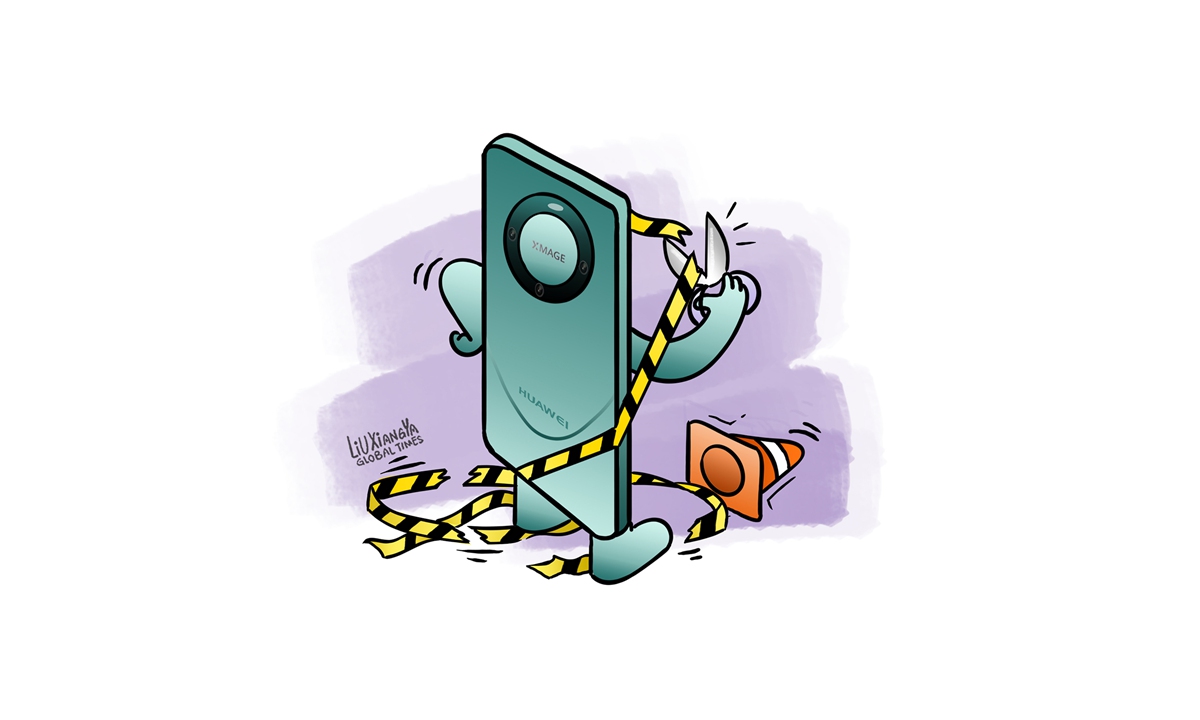
Illustration: Liu Xiangya/Global Times
The South China Morning Post published an editorial on Sunday with the headline "Huawei success a sign the US should rethink its containment policy." Hopefully Washington can respect the public opinion and stop suppressing Chinese technology companies. Even if not possible, it will be demonstrated that Washington's suppression policy is becoming increasingly ineffective in stifling China's high-tech development.
Just several days before Apple's September 12 event, where the company is expected to announce a new iPhones,
Huawei launched pre-orders on Friday for its Mate 60 and Mate 60 Pro models, with market speculating that Huawei will be able to regain some high-end market share from Apple.
In the past few days, Chinese consumers have flooded Huawei stores to snap up the new models. The reason why Huawei can win back market share is that the Chinese technology giant's new chip represents a technological breakthrough in the face of tough US sanctions. In contrast, although iPhone models released in recent years are perceived to be innovative, that doesn't mean they offer breakthroughs. Consumers will vote with their feet, offer rewards to companies focusing more on innovative breakthroughs.
The competition among enterprises ultimately depends on a market choice, instead of a political one. Only companies that can win more market share, earn more profit, and transform profit into sustainable development momentum can ultimately win the market. An escalated US crackdown on Chinese high-tech companies is a distorted hegemonic behavior under the forced intervention of the US government. Politicians in Washington are unable to distort market choices by focusing solely on using unilateral sanctions to suppress Chinese high-tech companies. In this process, Washington views the global high-tech competition through geopolitical lens, which has indeed inserted some pressure on Chinese enterprises, but market forces will prove Washington's efforts futile.
The US government has reportedly begun an official probe into chips being used in Huawei's smartphone, a move that has raised questions whether Washington will step up its crackdown on the Chinese high-tech company. If the US chooses to do so, it will backfire. China's Foreign Ministry on Friday slammed the US' abuse of state power in cracking down on Chinese firms, and stressed that US sanctions, containment and crackdowns won't stop China's development, but will only enhance its resolve and capabilities for self-reliance and tech innovation.
Of course, it will not be easy for Huawei to fully regain its previous market share from global competitors. Before the full impact of the US sanctions against Huawei was felt, Huawei's premium market share ran close to that of Apple in the first half of 2020, according to the Wall Street Journal. It will take time for Huawei to recover the market share it has lost.
The Mate 60 marks Huawei's comeback as a rival to Apple in the global smartphone market, with eye-catching sales aided by key technological breakthroughs. As Washington's suppression policy becoming increasingly ineffective, Huawei and Apple can compete against each other within a fairer competitive environment. Both companies have to think about how to maintain their influence and seize more market shares amid increasingly fiercer market competition. A reported upcoming release of new iPhones will probably display results of their first round matches.
Chinese manufacturing companies will not give up global market in the face of suppression by the US. This is reflected not only in the smartphone industry, but also in industries such as solar photovoltaics, cotton textiles, and electric vehicles. Chinese enterprises are making progress, although encountering difficulties. Huawei's comeback has given Chinese manufacturers more confidence to resist US hegemony. The secret to success in this act is to rely on technological innovation and product advantages to win the market.
Over the short term, the US is probably unlikely to change its policy of suppressing Chinese companies, but Chinese companies will never give up on striving for their legitimate interests. China has built solid foundation for achieving the sustainable development of its manufacturing industry, thanks to its industry chain advantages, cost advantages, technological innovation, and the constantly growing consumer market.
With Huawei's comeback, the competition between Chinese and US manufacturing is likely to become more intense, and China's unique advantages in its manufacturing sector will become the courage and strength for China's manufacturers to resist pressure from the US. Now, the counterattack has begun.
The author is a reporter with the Global Times. bizopinion@globaltimes.com.cn




